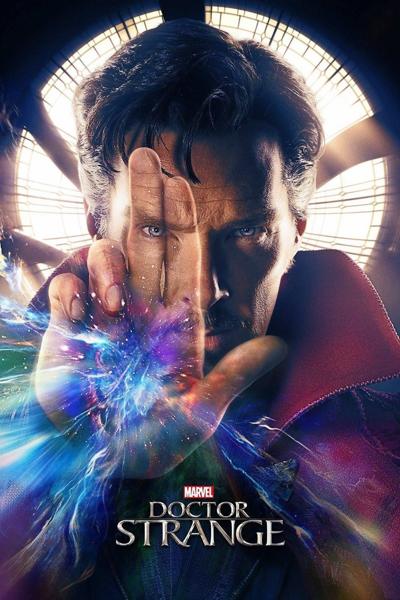
"You think this material universe is all there is. What if I told you the reality you know is one of many?" — The Ancient One (Tilda Swinton)
I've written many times about how Stan Lee taught me to read, and how artists like Steve Ditko and Jack Kirby taught me visual literacy, so I shan't bother going over it again — oops, too late — and my only regret is that none of my children have ever read a comic book. Hey, at about $5 a pop, how could they afford to? When I read 'em as a child, a dollar got you eight of the things. There was great wisdom in those tomes, if you knew where to look for it.
The quest for wisdom is the heart of Marvel's Doctor Strange, both comic and movie, and that by itself sets him apart from other superheroes who depend on muscle or outlandish superpowers. Practicing what looks like magic right out of Hogwarts, Doctor Strange unites fantasy and science fiction, as he chooses among multiple realities and quantum uncertainty. There's just as much Ernst Schrödinger as J.K. Rowling in the concept.
In the beginning, Dr. Stephen Strange (Benedict Cumberbatch) is a world-renowned neurosurgeon, more concerned with excess and celebrity than with the lives or dignity of patients. He's even openly contemptuous of fellow physician and girlfriend Christine's (Rachel McAdams) preference for saving lives in the emergency room over experimental grandstanding. When an auto accident robs his hands of the steadiness required for brain surgery, Stephen collapses into a depressive, months-long search for a path back to his former life, culminating in a last-ditch trek to seek the rumored mystical healing methods of "The Ancient One," an Oriental guru who reportedly works miracles. Little does Stephen suspect that the Ancient One has far more important things to teach him than how to steady his fingers.
Cumberbatch has marvelous — if you'll forgive the adjective — fun with the role, but mostly in the first 40 minutes while Stephen, consumed by his own hubris, has to learn to value himself for things other than his wealth and fame, not entirely unlike Tony Stark's personal journey in Iron Man. In fact, Cumberbatch plays a scene that's the most emotionally bare that any Marvel character has been awarded in these movies, and which drew an audible gasp from the audience. Director Scott Derrickson (Sinister) admirably holds off on the action and effects, allowing Cumberbatch to establish a convincing rapport with co-stars Tilda Swinton, Chiwetel Ejiofor, and Benedict Wong, before meeting the film's villain in the form of Mads Mikkelson, the latter of whom thankfully gets a well-done scene appealing to Doctor Strange that he is not the villain; that, in fact, it is Strange's teacher and mentor herself. Could he be right? I kind of like the duality of that interpretation. Even in real life, the villain never believes that's what he is. I've long wanted to see Ejiofor added to the Marvel Cinematic Universe, and he's perfect as Strange's fellow wizard, Baron Mordo. Wong (TV's Marco Polo) and Benjamin Bratt (The Infiltrator) work their own kind of magic in supporting roles that seem too brief.
Could there be a problem with Swinton? Well, certainly not with her performance, expertly matching other wizardly mentors in the vein of Obi-Wan Kenobi or Albus Dumbledore. It's not even the fact that, in the comics, the Ancient One is an old — really old — Tibetan gentleman, and Swinton is a not-so-old British gal, prompting accusations from fans of "whitewashing" the character. Indeed, despite protestations from Disney and Marvel that they simply chose the best actor for the part, it seems like they could have found, if not an actual Tibetan, an Asian or Asian-American actor who fit the bill. What was George Takei or James Hong or Cary-Hiroyuki Tagawa doing that one of them couldn't have spared six weeks? Of course, were he still with us, my personal choice would have been the venerable Mako Iwamatsu.
The answer lies in global geopolitics. China is an exploding market for international film distribution, and China doesn't recognize Tibet as an independent state. Specifying the Ancient One as Tibetan, as he is in the comics, might conceivably alienate this vital new audience, not to mention its government. On the other hand, casting any Asian actor and pretending the Ancient One is not Tibetan could alienate other Asian audiences in countries who do recognize Tibet. For Disney, it's a no-win scenario. Solution: Cast a white girl from England, then the whole sticky Tibetan question goes away, or at least they hope so. But should Western filmmakers take their cues from what they believe may irritate Chinese moviegoers?
Independent of this question, Doctor Strange finds Marvel’s cinematic universe returning to a somewhat less action-oriented origin story, allowing the film to be a little more character-driven, with the amazing effects depicting Strange and his cohorts skipping through dimensions much more intriguing, even mind-boggling, than watching the Hulk toss another tank across Manhattan. My only real regret is that artist Steve Ditko couldn't still be here to see this amazing realization of his comics vision. Go and prepare to be transported beyond this plane of existence, but be forewarned not to depart the theater until the credits have run their course.
And watch out for that impish Cloak of Levitation, the best "piece of clothing" character since the Sorting Hat.







